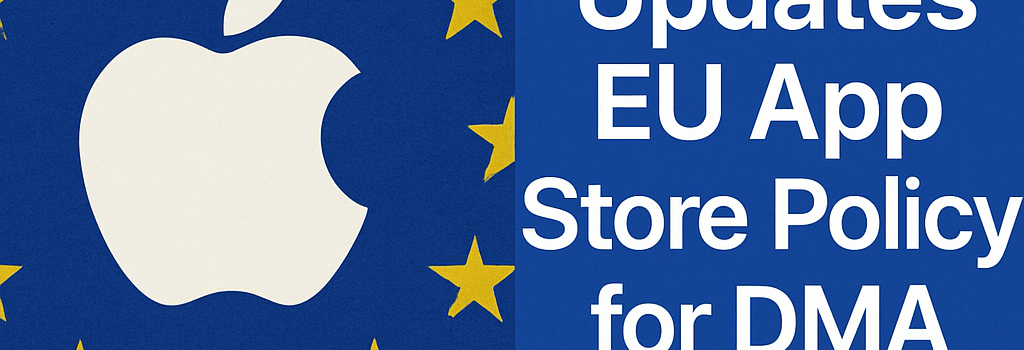Apple Updates EU App Store Policy for DMA Compliance

Background: Digital Markets Act and Apple’s Compliance Challenge
On June 27, 2025, Apple announced a series of significant changes to its App Store policies for users in the European Union, aiming to comply with the EU’s landmark Digital Markets Act (DMA) and avoid escalating fines that could reach up to 5% of its average daily worldwide revenue. The move follows a €500 million penalty in March 2025 for initial non-compliance and two months of intensive negotiations with the European Commission.
Key Policy Changes
- Third-Party App Distribution: Developers can now distribute iOS apps outside Apple’s App Store, including alternative app stores and direct downloads (“sideloading”).
- Alternative In-App Payment Systems: Apps may integrate third-party payment processors, bypassing Apple’s 15–30% commission, though Apple retains the right to charge a reduced 3% infrastructure fee.
- Developer Access to APIs: Expanded access to system APIs (notifications, background tasks, on-device AI inference) under a new fair-use licensing framework, addressing prior restrictions seen in iOS 17 betas.
- Transparent App Review Metrics: Publishers will receive detailed logs on review times, rejection reasons, and performance benchmarks.
Technical Implementation
To enable sideloading without compromising system integrity, Apple plans to extend its existing Gatekeeper framework. Key components include:
- Secure Boot Chain: Verifying kernel extensions and dynamic frameworks against Apple’s revocation list. Third-party stores will require notarization via a lightweight Gatekeeper Lite service.
- Enhanced Sandboxing: Each side-loaded app runs in a dedicated container with mandatory entitlements for file system and network access, enforced by a hardened Mandatory Access Control (MAC) module.
- On-Device Code Signing: Developers register unique cryptographic keys with Apple’s developer portal. Signatures are validated locally to prevent tampering, while preserving offline installation.
- API Throttling and Fair Use: Rate limits on sensitive APIs (e.g., CoreML, CallKit) to prevent resource exhaustion and ensure equitable performance across all apps.
Security and Privacy Considerations
While the DMA–driven opening of the walled garden introduces new vectors for malware and data exfiltration, Apple’s security teams are deploying layered defenses:
- Real-Time Threat Intelligence: Integration with on-device machine learning models to detect anomalous behavior in side-loaded apps.
- Automated Permission Reviews: Periodic sandbox audits that flag apps requesting excessive entitlements (camera, microphone, location) without clear user consent flows.
- Privacy Preserving Logs: Aggregated crash reports and telemetry that respect Differential Privacy standards, ensuring user anonymity even during security investigations.
“Allowing sideloading is a seismic shift for iOS. Our concern is maintaining the same security posture without diluting user trust,” said Jane Doe, Senior Analyst at TechInsights.
Developer and Market Response
Independent developers have expressed cautious optimism. Smaller studios anticipate saving on commission fees, potentially reinvesting savings into R&D and marketing. Major players such as Epic Games and Spotify, which previously faced App Store disputes, have welcomed the change, though they plan to continue challenging remnants of Apple’s fee structure.
In a recent survey conducted by DevPulse, 68% of EU-based developers reported plans to distribute at least one app outside Apple’s marketplace within the next year, citing lower costs and greater control over user engagement features such as custom loyalty programs.
Industry Impact and Future Outlook
The EU’s enforcement of the DMA is setting a global precedent. In the United States, lawmakers are reviewing similar antitrust measures, and India has signaled interest in adopting DMA-inspired rules as part of its Digital India strategy. Negotiations between Brussels and Washington on a broader trade deal have so far maintained a firm stance: the EU will not dilute its digital rulebook for bilateral trade concessions.
Looking ahead, the Commission has opened a public consultation period through mid-August 2025 to gather feedback from consumers, developers, and alternative store operators before issuing a final compliance verdict. Apple has signaled its intention to appeal certain technical requirements, particularly around API access and fee reductions, potentially prolonging the regulatory saga into late 2025.